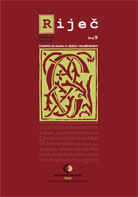Koncept neotuđivosti u pridjevskim konstrukcijama n-ed
Inalienability in Adjective n-ed Formations
Author(s): Nevena VučenSubject(s): Theoretical Linguistics, Morphology, Pragmatics
Published by: Filološki fakultet, Nikšić
Keywords: adjectives; compounds; inalienability; moderate inalienability; semantic field of body parts; semantic field of clothing; semantic field of parts of the house;
Summary/Abstract: The paper focuses on Ljung’s proposal of the inalienabilty concept and applies it to the N –ed adjective formations. Furthermore, the concept was elaborated by making a distinction between inalienable and moderately inalienable nouns. The paper addresses the body part semantic field as inalinable whereas other semantic fields such as clothing or house are referred to as moderately inalienable. The conclusion is that all the target nouns in N–ed adjective formations share one criterion in common, which is the concept of inalienability. Nevertheless, the author listed three key criteria for inalienability concept, i.e. lexical possessor, singularity, and modification. The lexical possessor criterion refers to the fact that inalienable nouns denote the object of which they are a part via lexical realization. The singularity criterion means that despite the fact that some inalinable nouns may appear in plural, these formations do not allow plural suffixation. And finally, the modification criterion means that there is a specific relation of modification between the adjective and the genitive constituent, i.e. the genitive complement is only valid through modification. However, as we discussed the internal relations between the constituents, our proposal is that in N–ed adjective compounds, the features of the inalienable nouns are somehow dried out by the external noun.
Journal: Riječ
- Issue Year: 2013
- Issue No: 9
- Page Range: 123-135
- Page Count: 13
- Language: Bosnian

